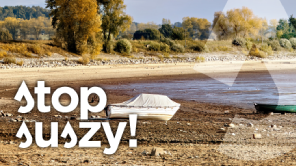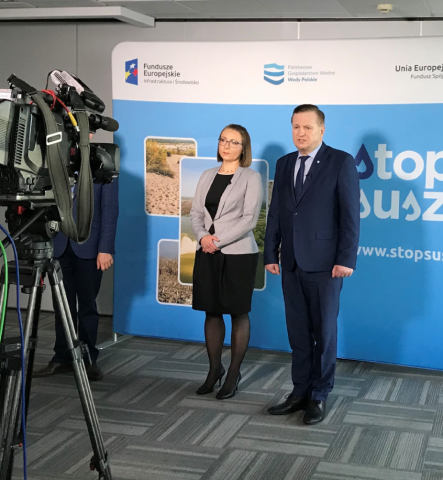State Water Holding Polish Waters completed the draft for the Drought Effects Counteracting Plan (DECP). Poland is one of only ten European countries which have devised and adopted such a planning document. Its aim is to indicate the most important directions for action in order to help us avoid a water crisis in Poland.
At the national conference “Drought Effects Counteracting Plan: Implementation by Cooperation”, the participants emphasised the key role of local government units in the implementation of DECP. The last stage in the preparation of the plan will be its adoption by way of a Minister of Water Management regulation. The legislative procedure will take around 3 months.
Krzysztof Woś, Deputy President of Polish Waters for Flood and Drought Protection, presented the stages of working on the document, which was devised in cooperation with Ministry of Marine Economy and Inland Navigation and Ministry of Agriculture and Rural Development, and was reviewed by voivodes. Then the draft plan was submitted to public consultations. As a result, the plan now corresponds to the expectations of the residents of many regions of Poland and their local governments. Over 800 motions were submitted during public consultations. “The Drought Effects Counteracting Plan includes 182 tasks which correspond to the expectations of local communities,” said Krzysztof Woś. “Moreover, the Plan includes 334 tasks related to small-scale water retention and 78 projects which have already been included in the investment programme of Polish Waters,” added the Deputy President of Polish Waters for Flood and Drought Protection.
At the press briefing which opened the “Stop drought!” conference, a speech was given by Małgorzata Stolarska, Ph.D., the head of the research team which devised the Drought Effects Counteracting Plan. She introduced the subject of the conference. “First and foremost, we will focus on administrative and legislative aspects, i.e. how to interpret the provisions of the Drought Effects Counteracting Plan so that they can be successfully implemented. DECP is a document addressed not only to state officials, but also entrepreneurs and private individuals, as it concerns water permits, for example,” explained Małgorzata Stolarska, Ph.D. The Drought Effects Counteracting Plan specifies what actions will be taken in the next few years in reference to water management, crisis management and the estimation of losses caused by drought. The aim is to limit the effects of drought by taking optimal actions, both technical (including construction projects) and non-technical (such as social education).
Małgorzata Bogucka-Szymalska, Deputy Director of the Department of Marine Economy and Inland Navigation, spoke at the conference and summed up the legislative process which had led to the development of the plan. She emphasised the important role of public consultations. Wojciech Skowyrski, Director of the Department of Investment at Polish Waters, drew attention to the fact that an important role in counteracting drought was played by various construction projects leading to the extension of available water resources, both in the case of small-scale and large-scale water retention. Other speakers who participated in the discussion panel on drought in Poland and the ways of counteracting its effects were: Małgorzata Bogucka-Szymalska, Deputy Director of the Department of Marine Economy and Inland Navigation, and Jarosław Wiśniewski, Deputy Director of the Department of Climate and Environment from Ministry of Agriculture and Rural Development.
DECP is the most important element of the “Stop drought!” project, which has been going for 2 years and has changed the social perception of drought in Poland. It has become generally known that Poland is one of the countries with the lowest water resources in the European Union. On average, 1,500 cubic metres of water is available per Polish citizen per year and in times of drought this number drops to only 1,000 cubic meters. In other countries it is 4,500 cubic metres per year. Thanks to “Stop drought!”, Poles have become more aware of the need to retain water, especially at the micro level, through actions such as growing flower meadows, starting rain gardens, collecting rainwater, etc. The public is also aware that heavy and short rainfall does not prevent drought.
Research carried out for the needs of DECP shows that a third of Poland’s territory is threatened by agricultural drought, so it is necessary to implement technical and non-technical measures whose aim will be to retain rainwater (at the micro and macro levels) and educate the public on rational water management, which is a duty of both individuals and municipalities (local government) and includes agriculture and other sectors of the economy. DECP is a document which organises knowledge on droughts in Poland and points to the methods of counteracting the effects which this phenomenon has on the economy, the natural environment and social life.
The most important element of DECP is a list of actions with 26 points. They are addressed to all water users and include all areas and types of drought. “To put it simply, these actions will be converted into a range of specific tasks and numerous planning documents to be implemented at the national, voivodeship and local levels. The title of the conference refers to the implementation of actions by cooperation, which means that it is necessary for the entire society to be involved in the project, which applies especially to representatives of the local government, representatives of the scientific community, entrepreneurs, social organisations and other stakeholders. One of the most important demands is to retain water as close as possible to the place where it falls or appears as meltwater. The most important role in this process is played by local governments and local communities. An improvement in the local water balance affects the water balance of the entire country. This is why the most important part of the required actions will be carried out at the local level. The aim of these actions is to comprehensively improve the situation and reduce the risk and losses caused by extreme hydrological phenomena, such as droughts and floods,” said Krzysztof Woś, Deputy President of Polish Waters. DECP includes over 590 planned construction projects. Most of them focus on increasing the current volume of retained water. There are also tasks which consist in the reconstruction of existing water facilities so that they meet the requirements of the Water Framework Directive and play an important role in counteracting the effects of drought at the national level. In the next years, Polish Waters is planning to significantly expand the scope of construction projects. Needs specified in DECP will be the basis for determining the location of such projects.
The Water Law of 20 July 2017 (Articles 183-184) stipulates that counteracting the effects of drought is a task of government administration authorities, the local government and Polish Waters, whereas the scope of their actions is determined in DECP. DECP is updated at least every 6 years. The plan contains an analysis of the possibility of increasing available water resources; proposals for constructing or reconstructing water facilities; proposals for changes in using water resources and changes in natural and artificial water retention; as well as actions aimed at counteracting the effects of drought. The provisions of this document need to be considered at the national and local level and included in the national spatial plan, voivodeship development strategies, voivodeship spatial plans, municipal studies of land use conditions and directions and local spatial development plans.
The provisions of DECP are included in the above-mentioned planning documents and administrative processes to a varying degree. At the national level, the provisions of DECP will be used as general recommendations, whereas at the local level, authorities will be generally obliged to directly implement the provisions of DECP. It will make it easier to draft basic planning documents, especially local spatial development plans and climate change adaptation plans in cities.
DECP is the first comprehensive project on counteracting the effects of drought in Poland. The President of the State Water Holding Polish Waters is obliged to prepare the drought effects counteracting plan under the provisions of Art. 240(2) (8) of the Water Law of 20 July 2017 (Dz. U. [Polish Journal of Laws] of 2020, item 310). After the adoption of DECP by way of a resolution, Poland will be at the forefront of European countries that have developed plans to counteract the effects of drought. Together with plans for water management and flood risk management, this document will improve the water balance in Poland.
So far, the “Stop Drought!” project has involved the establishment of a methodology used to prepare DECP, which will also be used in the future, and a survey among 3,500 entities dealing with water management. The draft plan was presented at national expert conferences and submitted to 6-month public consultations in 15 Polish cities. Over 1,200 people participated in public consultations. Over 800 comments and motions were submitted. The draft of DECP is available at www.stopsuszy.pl. The website also contains the latest data and news on drought published in the Stop Drought Report 2020. The project was carried out alongside a social campaign entitled “Remember about water!”. All works were financed by European funds (OPI&E 2014-2020).




